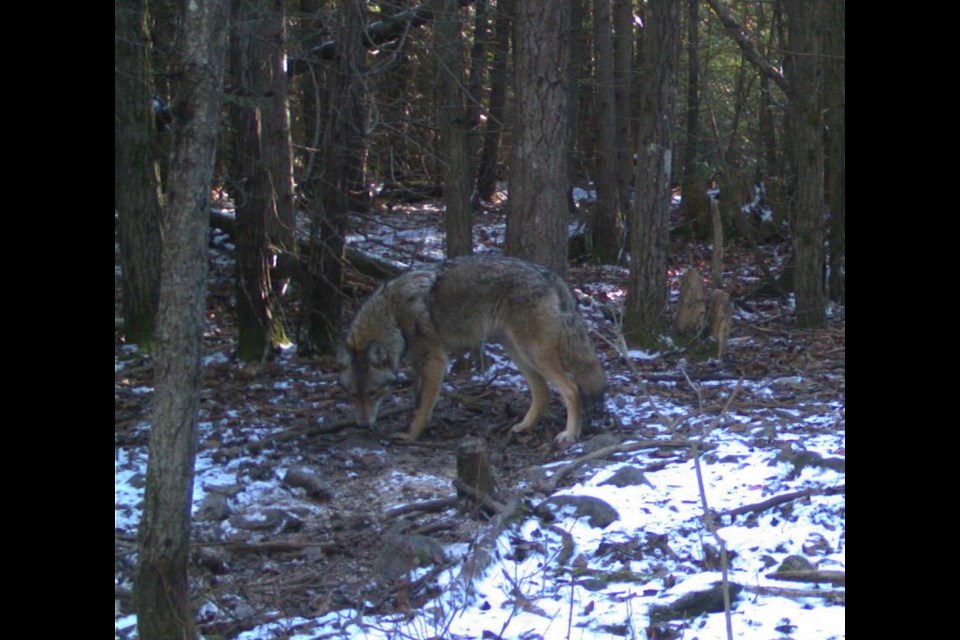Depending on where you live in Barrie, the screaming, howling and yip-yipping of coyotes might wake you up at night and send chills down your spine.
But your chances of ever actually having a direct encounter with a coyote within the city of Barrie are slim.
There are lots of sightings though, usually in the south end.
"A lot of calls we get are just sightings possibly from people that have moved up to Barrie from the south," said Jason Forgrave, Supervisor Bylaw Services for the city of Barrie. "I think a lot of it is the shock factor. People seeing the animals and not used to seeing them."
Experts say newly-built subdivisions were the coyote's territory five years ago and now we have moved in but the coyotes have not moved out.
"Thankfully coyote encounters with people are fairly rare," according to Dr. Brent Patterson, research scientist with the Ministry of Natural Resources and Forestry. "Normal coyote behaviour is to be secretive, largely nocturnal and to be afraid of people. It's a red flag if you see coyote in daylight or one coming too close to people."
From all the nocturnal howling, it would be easy to think that there are many coyotes in our suburban midst.
There is no data specific to the Barrie area but regionally population indexes show coyotes went through a fairly steady increase in the 2000's that peaked in 2010.
But there's no doubt - coyotes are everywhere and occupy all habitats both urban and suburban.
"From studies of similar landscapes the density might be somewhere between 20 to 35 coyotes per every hundred square kilometres," Patterson said. "The coyotes that you're hearing physically and genetically are the same coyotes that somebody might've heard from that spot in 1970. Not the same individuals but the same bloodline."
The danger to humans is low but for pets it's a different story.
The city of Barrie Bylaw Services keeps a lost and found log for missing pets but there's no specific information relating the disappearances to coyotes.
Missing pet posters dot south end neighbourhoods and some home-owners fear the worst and believe coyotes are the prime suspects.
Experts say if you allow pets to roam free you are running a risk.
"Don't leave garbage or food out in your yard or leaving small pets to wander in your yard," said Forgrave. "If you're going for a walk keep your pets leashed and with you at all times. Not only is it a bylaw but it's for the safety of your pet and yourself."
In his nearly 20 years with Bylaw Services, Forgrave cannot recall any reported coyote attacks on pets within the city but there have been a few, mostly on the outskirts, including a recent incident in Midhurst where a coyote took off with a small dog.
"It can happen in suburban areas," said Patterson. "Sometimes they eat cats and sometimes they do attack and eat dogs. A lot of those attacks do occur at night but if I had a small dog and lived in an area that I knew was frequented by coyotes, when I was walking that dog I'd keep it on a leash. The risk of my dog being attacked is quite low but the risk does exist."
Patterson says recent reports of coyotes mating with pet dogs are simply not supported by science.
"We've done extensive genetic work on coyotes and there is actually some dog DNA in our coyotes but its fairly rare," explained Patterson. "We see very little evidence of any contemporary inter-breeding with dogs."
A surprising finding, according to Patterson's research, is that even in Toronto for example, there are coyotes living in the downtown but the majority of their diet is still a natural diet.
They do eat some garbage and the odd pet but primarily they're still feeding on mice and squirrels, natural items even in that environment.
Coyotes are remarkably adaptable to their surroundings.
"Generally we seem to be able to co-exist with them," adds Forgrave. "They're very wary animals they'll see you long before you see them. Hearing them is a different story."
You can find more facts about coyotes at ontario.ca/livingwithwildlife



